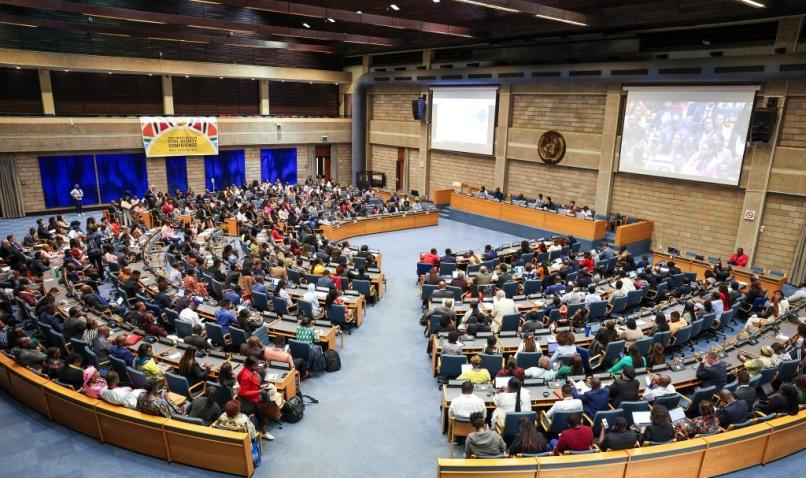By Sarah Jackson
On 9 and 10 May 2024, over 2 000 civil society leaders converged in Nairobi, Kenya, at the 69th UN Civil Society Conference to envision a people’s agenda for the UN Summit of the Future. The high-level meeting, scheduled for September, seeks multilateral solutions to the world’s greatest challenges.
Throughout the conference, civic leaders conveyed an overwhelming sense that the global response to the polycrisis, permacrisis and planetary crisis is fundamentally broken. Delegates reflected on the stark disparity between the gravity and scale of problems — encompassing the climate crisis, widespread conflict, soaring sovereign debt, escalating inequality and unregulated artificial intelligence — and the bureaucratic inertia of institutions to enact meaningful transformation.
Multilateral institutions, including the UN Security Council and international financial architecture, are failing to effectively address the needs of those who have contributed the least to these crises, yet are affected by them the most
Sarah Jackson, Deputy Regional Director, ESARO
Multilateral institutions, including the UN Security Council and international financial architecture, are failing to effectively address the needs of those who have contributed the least to these crises, yet are affected by them the most.
Nevertheless, multilateralism was acknowledged as the sole way to marshal a global collective response to these existential challenges for current and future generations. However, the zero draft pact — co-facilitated by Namibia and Germany — fell short of the boldness and courage necessary to address them. Many lofty aspirations, such as the aim to “end poverty in all its forms” by 2030, lacked concrete measures to enact meaningful change. Without civil society advocating for a more ambitious Pact for the Future, we risk failing to ensure an effective global response to these crises.
During the event, Amnesty International convened with the African Forum and Network on Debt and Development, Oxfam, the International Budget Partnership and the Kenya Human Rights Commission to promote human-rights-centred economies.
If current trends persist, by 2030, an estimated 575 million people will still be living in extreme poverty, despite the Sustainable Development Goals’s commitment to eradicate it entirely by that year. Economic shocks, exacerbated by the Covid-19 pandemic, have intensified indebtedness in countries already facing debt crises. States such as Mozambique are increasing borrowing to address extreme weather events caused by the climate crisis.
Each crisis contributes to mounting debt, which creditor countries and multilateral institutions then leverage to impose policy reforms, deepening austerity measures and disproportionately affecting the most vulnerable populations. More radical debt restructuring and relief are urgently needed to ensure debt repayments do not come at the cost of health, livelihoods and other human rights.
Progress towards a UN Framework on Tax Cooperation is promising, as is the establishment of a Loss and Damage Fund for developing countries affected by climate change, alongside initial efforts to restructure sovereign debt. However, these proposals are not an alternative for considering how we address the need to reconsider paradigms of human progress and the equitable distribution of growth both within and between nations.
Panelists at our event emphasised the necessity of moving beyond GDP as a sole measure of progress in terms of economic growth as it fails to account for wealth distribution and overlooks essential contributions of unpaid care and domestic work, despite their role in “glueing our societies together”, as stated by Blandina Bobson of Oxfam.
While the exact name may vary, whether it is called the “human rights economy”, “rights-based economy”, “new economy”, “doughnut economy, “an economy in service of life” or “eco-social contract”, the underlying principle remains the same: human rights must form the core of an economy that fosters the well-being of both people and the planet.
Dubbed by the UN secretary general António Guterres a “once-in-a-generation opportunity to reinvigorate global action, recommit to fundamental principles, and further develop the frameworks of multilateralism so they are fit for the future”, the UN Summit of the Future will produce a Pact for the Future, a Declaration on Future Generations and a Global Digital Compact.
Issued a week after the conference, the revised draft pact contains stronger language on some economic justice issues, though it could be more ambitious. Crucially, it acknowledges that more capital is flowing out of developing countries than is flowing in.
The draft commits to exploring options for global minimum taxation on high net-worth individuals and seeks “ambitious outcomes” on universal social protection at the Fourth Conference on Financing for Development. It also commits to a new goal for climate finance at the upcoming UN Climate Conference (COP29) and calls on the UN secretary general, in collaboration with the International Monetary Fund, to review the sovereign debt architecture.
Yet none of these commitments are guaranteed or framed in a way that will lead to immediate action. Their inclusion, and whether they are further strengthened or diluted, depends on state positions at the Summit of the Future. ImPACT coalitions have been formed to advocate with states, but some civil society groups have expressed concerns that this “multi-stakeholderism” enables corporate influence. Nonetheless, there remains a shared understanding that effective solutions rely on lived experiences and the expertise of social movements and civil society.
Our future is too important to be left solely to states
Sarah Jackson
Our future is too important to be left solely to states. In this interregnum where the old is dying, but the new is not yet born, civil society must midwife bolder ideas, craft compelling narratives and mobilise constituencies around them. While the outcome of the UN Summit of the Future is far from assured, the lead-up is an opportunity to shift the conversation and galvanise momentum toward rights-respecting futures.
Sarah Jackson is Amnesty International’s deputy regional director for East and Southern Africa.
This op-ed first ran in South Africa’s Mail and Guardian


